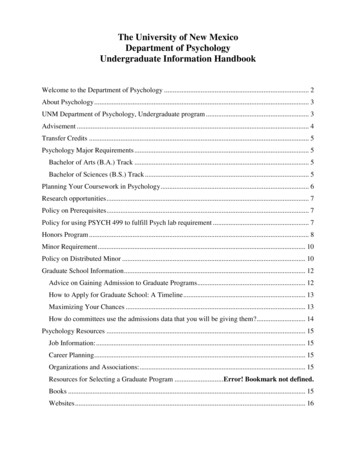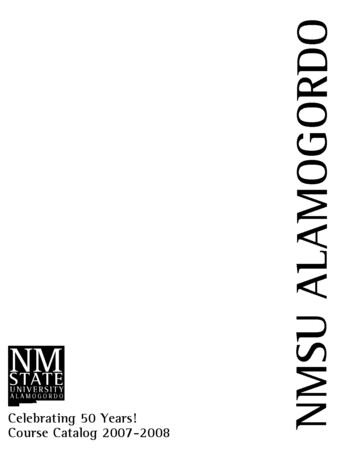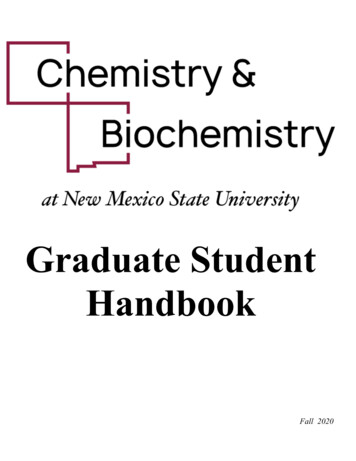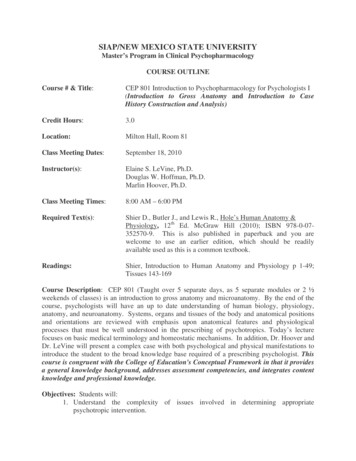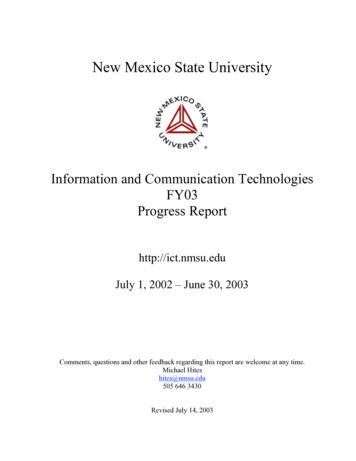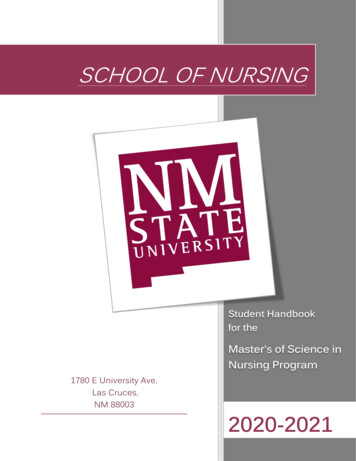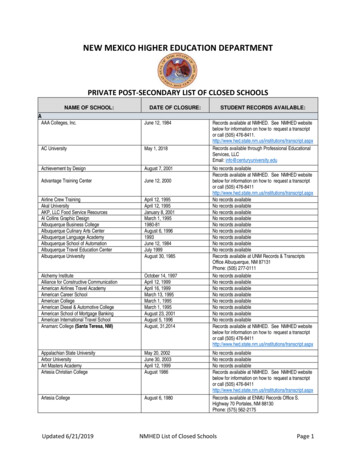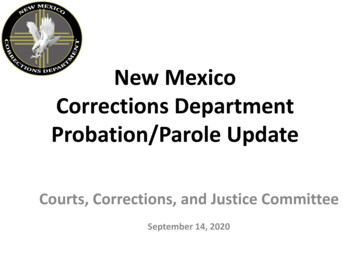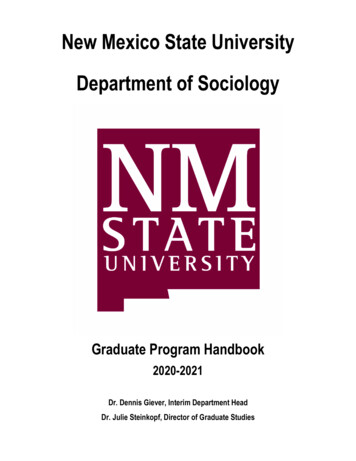
Transcription
New Mexico State UniversityDepartment of SociologyGraduate Program Handbook2020-2021Dr. Dennis Giever, Interim Department HeadDr. Julie Steinkopf, Director of Graduate Studies
Department of Sociology OverviewThe Department of Sociology at New Mexico State University has a mission to serve the University, state, UnitedStates/Mexico border region, and beyond through: 1) courses and curricula based on a core value of theoretical andsocial diversity, 2) scholarship and creative activity that advances knowledge and promotes a more just society, 3)service to the university, the discipline, and the community, and 4) outreach activities focused on social, economic, andcultural issues of concern to people locally, nationally, and globally.The department offers a diverse curriculum covering a wide range of topics, and all graduate students receive athorough grounding in theoretical and methodological aspects of sociology. NMSU’s unique location attracts faculty andstudents who are interested in peoples of the southwest, particularly Hispanics/Latinos and American Indians. Inaddition, the University’s proximity to the U.S./Mexico border provides an ideal context for the examination of suchissues as globalization, transnational migration, and the consequences of border development. Faculty routinelyexamine the intersections of race, class, gender, and sexuality in both research and teaching. Based on current courseofferings, research endeavors, and faculty specializations, the department has three main areas of focus: InequalityEnvironment/DevelopmentInstitutions and OrganizationsThe Graduate Program in Sociology offers a terminal Master’s Degree that can be pursued either in an on-campuscontext or an online format. There are two tracks possible for the on-campus program: thesis or comprehensive writtenexam. Online students are only able to participate in the comprehensive exam track at this time. The Department hasabout 50 total graduate students enrolled in the on-campus or online program. There are currently nine full-time, tenuretrack or college-track faculty, as well as several adjunct faculty who together work with students to foster a high level ofinteraction, learning, and mentoring. The graduate program’s goal is to prepare students both professionally andpersonally to pursue further study in a doctoral program or a future career using sociological tools. We have a lowstudent-to-faculty ratio, which allows for maximum student-faculty interaction, smaller seminar classes, and qualitymentorship for those students who wish to complete a Master’s Thesis.The Department also offers a Graduate Minor in Sociology for students currently enrolled in other graduate programs atNMSU.Sociology graduate students are valued, active participants in intellectual discussions and research pursuits. We havehad students work as research assistants on faculty grants, collaborate with faculty members to co-author publications,and present papers at professional meetings.The department awards 7-8 Graduate Assistantships (GAs) each year to new and current students. Graduate Assistantscan be funded for up to four semesters, and are usually employed for 10 hours a week. Graduate Assistants areassigned an office within the Department, and have access to computers equipped with MS Office, Internet, and printers.General graduate students are also invited to use graduate student-designated office space, and also have access tocomputers and printers.Several resources were adapted in the creation of this handbook of graduate program guidelines, namely from Ohio University, the University of Oklahoma, and the Departments ofPsychology and Anthropology at NMSU.2
Department of Sociology and NMSU GuidelinesI. POLICIES, PROCEDURES, AND DEGREE REQUIREMENTSThe Master of Arts degree in sociology is a 36-credit hour program designed through tracks that require students to worktoward either a thesis or a written comprehensive exam. Further, the MA program is structured through two differentoptions: an on-campus MA cohort or an entirely online MA cohort. On-campus MA students may choose from either thethesis track or comprehensive exam track. The thesis track is typically selected by students who intend to pursue adoctoral degree, while the comprehensive exam track is commonly pursued by students desiring immediateemployment. Online MA students are only able to pursue the comprehensive exam track at this time.Both the thesis and comprehensive exam tracks require core courses (SOC 501, SOC 551, SOC 552, SOC 553, SOC561) that must be taken within the first 27 hours of graduate credit. It is recommended that student’s take the corecourses as early as possible. A grade of B- or better is required to receive credit for each core course.The thesis track also has six required master’s thesis credits (SOC 599) that should be taken after successful defense ofthe master’s thesis proposal. A student may take more than six thesis credits, however only six may be used to satisfydepartmental graduation requirements.Both the thesis and comprehensive exam tracks require additional 500 level Sociology courses (15 credits for oncampus thesis track; 21 credits for on-campus comprehensive exam track; 21 credits for online comprehensive examtrack) for completion of the degree. Within Sociology, courses at the 400 level are considered undergraduate coursesand do not count toward your elective requirements.Thesis track students must successfully defend a master’s thesis in their final semester in the program. Comprehensiveexam track students must successfully pass a final master’s written examination on required coursework once all coreclasses have been completed with a grade of B- or better earned in each course.On-Campus Program vs. Online ProgramThe on-campus and online MA programs are distinct, and have separate cohorts that begin in the fall of each academicyear. Once a student is admitted into the on-campus or online program, the student is expected to remain in thatprogram through degree completion. Students cannot switch between programs; if a student wishes to switch, thestudent must reapply to the desired program in order to be considered for admission. Online courses are usuallyreserved for online program students, and on-campus courses are intended for on-campus students. On occasion,online students may wish to take an on-campus course, or on-campus students may wish to take an online course. Thestudent must make a formal request, in writing, to enroll in such course to the Director of Graduate Studies.Graduate CourseworkA typical graduate student course load is 9-credit hours (usually three 3-credit courses). On occasion, students may wishto enroll in more credit hours, however the academic and personal demands of graduate school can often beoverwhelming if students take more than three classes in a semester. The department has a typical plan of study, whichis noted on the following page, for on-campus students. Online students are urged to follow a similar plan of study sothat degree requirements can be fulfilled in a timely manner. Full-time students are expected to complete all degreerequirements by the end of the fourth semester of study.It is not unusual, however, for students to take fewer than 9 credits per semester. These students often choose to take 6credits a semester for one or more of the following reasons 1. Nine credits hours is excessive for individuals who have3
significant employment and/or family responsibilities 2. NMSU charges non-New Mexico residents 125% of in-statetuition rates if 6 or fewer credits are taken, which is significantly less than non-resident rates* 3. Six credits is usually theminimum number of credits needed to qualify for financial aid (consult with the financial aid office for your particularcircumstances) 3. Six credit hours a semester results in a reasonable time to degree (6 semesters).*If you are a resident of a WICHE member states, however, you are eligible for 6 semesters of New Mexico residenttuition rates if you take at least 5 credits and maintain a 3.0 GPA (see Funding Opportunities below).Master’s Degree Plan of StudyThe following plan of study is based on 36 credits required for both on-campus and online students pursuing theMaster’s Degree in sociology. Students are welcome to take summer courses, however core required courses are notoffered in the summer (only elective courses are offered, and only as university funding allows).Fall Semester ISpring Semester I Perspectives on Sociology (501)* Quantitative Research Methods (553)* Classical Sociological Theory (552)* Issues in Quantitative Analysis (551)* Qualitative Research Methods (561)* Sociology Elective9 total credit hoursFall Semester II9 total credit hoursSpring Semester II Sociology Elective** Sociology Elective** Sociology Elective Sociology Elective Sociology Elective Sociology Elective9 total credit hours9 total credit hours*Denotes required courses (15 credits total) that must be taken within the first 27 hours ofGraduate credit. A grade of B- or better is required to receive credit for each core course.4
**Denotes thesis hours (6 credits total) required for the Thesis TrackPolicies on Academic Integrity and Plagiarism for Coursework:The department insists that all students uphold New Mexico State University’s Student Code of Conduct, “Students atNMSU have an obligation to uphold the laws of the larger community of which they are a part.” Therefore, incidences ofacademic dishonesty, collusion, and plagiarism on coursework will not be tolerated.Plagiarism refers to appropriating excerpts from websites, books, journal articles, etc. without proper in-text citationreferring to the original source of the material. For further clarification on what constitutes plagiarism, please refer toNMSU’s library website: http://lib.nmsu.edu/plagiarism/In the event there is plagiarism and/or violation of academic integrity on sociology graduate coursework:The Graduate Committee will meet to determine if any violations of academic integrity or plagiarism did, indeed, occur. Ifthe committee determines it occurred the following will happen. The first infraction will result in failing the course. Thesecond infraction will result in the student being removed from the program without the option to complete the degree.General Graduate Student ResponsibilitiesThe Department of Sociology admits a select number of competitive students each academic year for the graduateprogram. It is important to note that the department has clear expectations for all graduate students, in addition tomaking adequate progress toward (and eventually completing) the Master’s Degree. The following are general graduatestudent responsibilities: Attend classes and be in contact with professors regularly Complete all assignments, papers, and exams for classes Resolve incompletes within two semesters Choose a thesis or comprehensive track Be available for NMSU and departmental communication Use NMSU email addresses at all times Be respectful with fellow students, faculty, and staff Follow up with any outstanding assignments in a timely manner Participate in departmental opportunities and events File all necessary paperwork for theses, exams, and graduation Practice professional communication at all times Complete a departmental progress report each semester Strive to problematize, contextualize, synthesize, analyze, articulate, dialogue,and critique in your academic efforts Report issues and concerns directly to the Department Head Be the best graduate student possibleAll graduate students can use one of the offices designated for graduate student use as a quiet space to study, preparefor class, use computers, or print assignments. Check with the Director of Graduate Studies for which offices areavailable, and please be respectful of fellow students and faculty in close proximity.Departmental Graduate Student Evaluation and Progress ReportsGraduate students (both on-campus and online) are evaluated annually on their academic progress, performance, andprofessional potential. Graduate students are therefore responsible for submitting a “Graduate Student Progress Report”at the end of each semester. The progress report requires students to document progress in completing core course5
requirements and additional coursework, progress in either the thesis track or comprehensive exam track, completion ofGA duties for the semester (if applicable), and documents any engagement in professional activities. Failure to submit aprogress report by the designated semester deadline may result in a hold being placed on course registration or delaythe filing of graduation. Progress reports are not needed for summer sessions.Progress reports and general feedback solicited from Sociology faculty are reviewed by the student’s faculty advisor andbrought to the attention of the Director of Graduate Studies if there are any problems. A student may receive a warningor dismissal evaluation due to a number of factors, such as academic misconduct, plagiarism, receiving failing coursegrades, inadequate progress toward thesis completion, failing the comprehensive exam in two subsequent semesters,having more than three outstanding incompletes in sociology graduate courses, or engaging ininappropriate/unprofessional interpersonal communication. Annual progress reports and any departmental studentevaluations will be kept in the student’s administrative file.Graduate Assistant Evaluations and Assistantship RenewalAt the end of each academic year, the graduate committee will meet to formally evaluate each graduate assistant interms of overall performance in coursework, progress toward degree completion, timely development of thesisrequirements or progress toward completion of comprehensive exam, handling departmental responsibilities,maintaining positive working relationships with fellow students and faculty, fulfillment of Graduate Assistantresponsibilities, engaging in professional communication with others, and growth as a professional. The committee willconsider the student’s performance as exceptional, adequate, problematic. The committee will also discuss the graduateassistant’s progress reports, faculty insights, and any additional formally documented information in recommendingeither renewal or nonrenewal of the Graduate Assistantship. The Director of Graduate Studies will forward therecommendations to the Department Head for further consideration.Sociology Graduate Student OrganizationThe Sociology Graduate Student Organization (SGSO) is a university-sanctioned organization for sociology graduatestudents. The SGSO is a great way to meet and socialize with fellow colleagues, participate in university/local service,and obtain funding for research and academic conferences. The SGSO usually meets twice a month, and has bothorganizational and social meetings. Officers are elected each year, and the SGSO is open to both on-campus and onlinestudents who wish to attend.AdvisementThe Director of Graduate Studies will be assigned as the initial advisor for all incoming graduate students. During thefirst semester, students will be assigned an advisor who is also a member of the graduate committee. Advisorscorrespond with their advisees regarding registration, programmatic questions, departmental policies/procedures,progress toward degree completion, and graduation requirements. For thesis-track students, the thesis chair should alsoserve as their advisor. Students who wish to change their advisors should complete the “Change of Advisor” form andfile it with the department.IncompletesAccording to the NMSU catalog “Instructors may assign I grades only if the student is unable to complete the course dueto circumstances beyond the student’s control that develop after the last day to withdraw from the course. Examples ofappropriate circumstances include documented illness, documented death or crisis in the student’s immediate family,and similar circumstances. Job related circumstances are generally not appropriate grounds for assigning an I grade. Inno case is an I grade to be used to avoid the assigning of D, F, U, or RR grades for marginal or failing work.”6
Upon agreement that the student is eligible for an Incomplete, the student and instructor must agree on the requirementsfor the removal of the I and complete the I grade information form. Per NMSU policy, incompletes must be resolvedwithin one year. The department requires that a student should have no more than three incompletes in sociologygraduate courses upon graduation.Provisional AcceptanceIn certain cases, graduate students who do not meet the admission requirements of the department may still beaccepted provisionally. The student is accepted for a probation period of one semester wherein the student must earn atleast an A- in each sociology graduate course taken. Subsequently, written documentation must be submitted from eachcourse instructor demonstrating support of the student being permanently accepted into the program. Students admittedwith an undergraduate GPA below 3.0 are automatically assigned provisional status by the graduate school.Professional Communication ExpectationsThe department expects all graduate students to behave professionally in the classroom (on-campus and virtual),around departmental offices, and at department and university-sponsored events. Thanks to a technologically savvy,social media-centered culture, students should also be aware that they are representatives of NMSU and theDepartment of Sociology even when they are not in classes, on university property, or engaging in graduate programduties. Online photos, discussions, comments, and the like reflect on both the student as well as the university. Studentsshould actively engage in professional communication on the telephone, in person, and over email between faculty, staff,and fellow students. Graduate students are advised to report any issues, concerns, conflicts, experiences with hostility,harassment, or inappropriate interactions within the department directly to the Department Head.Academic and Non-academic MisconductSociology graduate students are held to NMSU policies and procedures regarding misconduct. The Student Code ofConduct defines academic misconduct, non-academic misconduct and the consequences or penalties for each. TheStudent Code of Conduct is available in the NMSU Student Handbook online: http://studenthandbook.nmsu.edu/.Incidences of academic dishonesty, collusion, and plagiarism will not be tolerated. Plagiarism refers to appropriatingexcerpts from websites, books, journal articles, etc. without proper in-text citation referring to the original source of thematerial. For further clarification on what constitutes plagiarism, please refer to NMSU’s library website:http://lib.nmsu.edu/plagiarism/When violations of academic integrity or plagiarism occur in sociology graduate courses:The Graduate Committee will meet to determine if any violations of academic integrity or plagiarism did, indeed, occur. Ifthe committee determines it occurred the following will happen. The first infraction will result in failing the course. Thesecond infraction will result in the student being removed from the program without the option to complete the degree.When violations of academic integrity or plagiarism occur on a thesis:The Graduate Committee will meet to determine if any violations of academic integrity or plagiarism did, indeed, occur. Ifthe committee determines it occurred the student will be removed from the program without the option to complete thedegree.When violations of academic integrity or plagiarism occur on the comprehensive written exam:The Graduate Committee will meet to determine if any violations of academic integrity or plagiarism did, indeed, occur. Ifthe committee determines it occurred the student will be removed from the pr
New Mexico State University . Department of Sociology . Graduate Program Handbook . . The Graduate Program in Sociology offers a terminal Master’s Degree that can be pursued either in an on-campus . The Department also offers a Graduate Minor in Sociology for students currently enrolled in other gra
